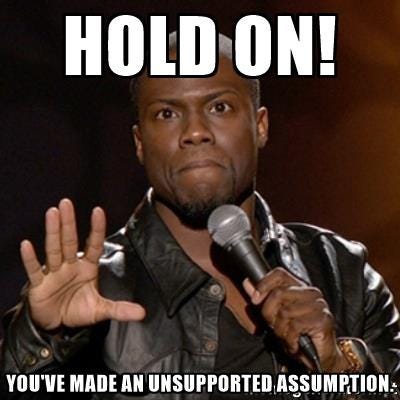Spoiler Alert: They Weren’t Thinking What You Thought
Witty Banter
We all do it—expect things from others and assume things about situations.
But have you ever noticed how these two ideas, while seemingly different, often walk hand in hand?
We talk about expectations as goals or hopes for the future.
We see assumptions as the invisible groundwork our thoughts stand on.
But in practice? They blur. They reinforce each other. And sometimes, they trap us.
Let’s unpack this strange little dance.
Expectations: Hopes in disguise
Some expectations are healthy—they help us plan, drive ambition, and set standards. But others can be unrealistic, unspoken, or even quietly destructive. It is like we keep expectations with ourselves for things but we never think if I don't get them done, then what? Also we keep unrealistic expectations that we know are impossible to achieve but still keep them, as we see those expectations as sense of hope, a hope we know for something to happen, knowing very well there is very little to no chance for it to happen. Once you start expecting things, you can't stop because hope keeps in you a veil of lies that it is possible.
Assumptions: Invisible agreements no one signed for
Imagine you're hiking through the forest. It's late afternoon, and you're tired. You see a large, flat rock ahead—finally, a place to sit and rest. You walk over, drop your backpack, and plop down onto it with a heavy sigh. Except… it's not a rock. It looked like a rock. It was shaped like a rock. But as soon as your weight hits it, it wobbles—and you realise it’s a moss-covered turtle the size of a small boulder. The poor turtle bolts (as fast as turtles can bolt), and you’re left half-startled, half-horrified, and now… without a seat. This is what assumptions do to us. They look solid. From a distance, they resemble certainty. But get too comfortable, and you’ll realise how fragile—and foolish—they can be. We assume because it feels like the right thing. It saves time. It gives a sense of control. But nature doesn’t care about what you assumed.
The Overlap
Let’s say you’re leading a project with your friends. You assume your friend knows the deliverable is due Friday. Based on that, you expect them to submit it by Friday morning. But your teammate assumed the deadline was Monday. Cue the confusion, disappointment, and that awkward moment when nobody really did anything wrong, yet things still go sideways. That’s the trouble—expectations built on assumptions feel justified, even when they’re not. We make assumptions on things and then this leads to making unrealistic expectations, which in turn are never fruitful at the end.
The Vicious Cycle of Assumptions
Here’s where things get really interesting—and messy.
You make an assumption without realising it.
(“They should know I’m upset.”)You build an expectation on top of that assumption.
(“They’ll apologise soon.”)Reality doesn’t align, because no one else had the same internal story.
(“They didn’t even notice I was upset!”)Frustration or resentment builds, but you say nothing—because shouldn’t they just know?
A new assumption is born: “They don’t care.”
And so the cycle loops. Quiet assumptions become unspoken expectations, unmet expectations become emotional responses, and emotional responses reinforce new assumptions. This feedback loop can poison relationships, break friendships, and erode trust—all because something was never said out loud.
Conclusion


Comments
Post a Comment